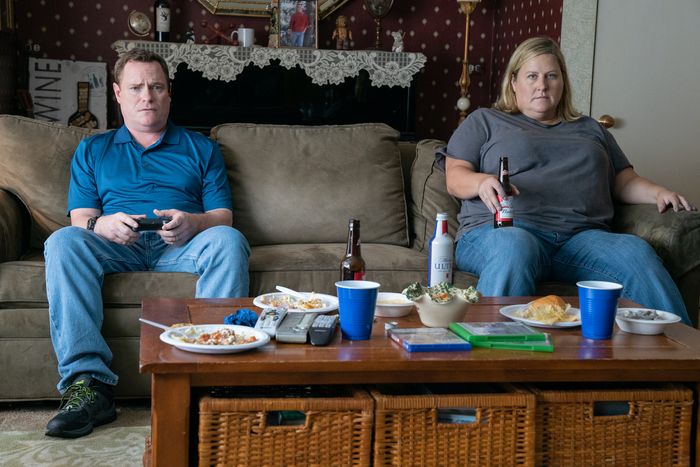
A chicken. A cornfield. A tractor with a faded American flag flapping in the foreground. As this montage plays, Connie Conway croons a ’50s tune called “Kansas State Line” about how he has never left home but is a “rover at heart.” After this opening to Somebody Somewhere — the new HBO series created by and starring comedian and cabaret singer Bridget Everett — there’s a hard cut to someone whose dream of leaving has failed: Sam Miller (Everett), who sits in a fluorescent-lit room, marking a standardized-test booklet and filing it among a sad stack of folders. Sam does not fit in her hometown of Manhattan, Kansas. She may have tried to get out for a while. Now she’s in her 40s, with a job she dislikes, disconnected from everyone and unsure of what she wants or who she is.
Somebody Somewhere, which premieres this Sunday, is a patently personal project for Everett, who also grew up in Manhattan, Kansas, but went on to become a fixture of the New York comedy-and-music scene. Everett sings, does stand-up, and performs in shows that combine cabaret, storytelling, and big, raunchy spectacle. (This is her first successful project for TV; she made a well-reviewed but fruitless pilot for Amazon Prime in 2017.) Her path to a theater career came in part via her popular karaoke performances. One of her go-to songs was Janis Joplin’s “Piece of My Heart,” a number Everett’s character, Sam, also performs. This makes the show feel like an alternate history, one that wonders what might have happened if Everett had never left home, never found her voice after high school.
We learn that Sam originally moved back to Manhattan to care for one of her sisters, who then died and left Sam grieving and completely adrift, lacking purpose or close friends. We also learn that Sam’s mother is an alcoholic, something the whole family tries to ignore. The show’s pilot episode is blunt, offering a quick found-families narrative that tries to abruptly stanch Sam’s pain. Joel (Jeff Hiller), a co-worker at Sam’s test-grading job, approaches her: He remembers a performance she did in high school, and he soon invites her to what he calls “choir practice” — an unsanctioned late-night gathering at his church, where town oddballs (read gay, liberal, not white, or otherwise out of place) get together to sing karaoke and drink and feel safe. Egged on by Joel, Sam gets up and performs for the first time in years. The lights sparkle. The crowd is awed. Sam lost a lot of time, but now she has found her people.
A lesser show would veer in one of two directions: Sam would traverse the flimsy obstacles thrown in her way until some weepy conclusion (mom sobers up, tells her she loves her), or there would be a pivot toward darkness (choir practice collapses, Sam is caught in a loop of self-loathing). Somebody Somewhere is too honest to take either route. Her and Joel’s lives both continue to meander. They just do it in a direction that trends ever so slightly away from isolation, lurching and regressing and groping their way toward feeling okay.
And Everett is fantastic. Even with strong performances from Hiller as Joel and Mike Hagerty as Sam’s dad, Ed, Somebody Somewhere lives and dies with Everett’s remarkable tenderness toward this other, imagined version of herself. She hits her comic beats just hard enough and projects uncertainty with lovely subtlety. In the all-important karaoke scenes, Everett — who knows how to dominate a stage — allows her voice to wobble, a performance of ambivalence. She walks through the scenes with an instantly legible posture: You can see that Sam knows this place, and she knows these people. She loves them, and she knows they love her. And, even so, everyone knows she doesn’t quite fit. Sometimes she slinks. Sometimes she walks defiantly. Sometimes her stance dares people to criticize her body (often clad in T-shirts with the hems cut off, unlike her surviving sister’s prim floral-embroidered tops), while in other scenes she tries to disappear.
It’s worth triangulating this show within TV’s growing lineage of serious-funny half-hours, such as Girls, Better Things, Master of None, Atlanta, Insecure, and Transparent, whose star Jay Duplass directs some of Somebody Somewhere and has a producer credit along with his brother Mark. These series tend to be obliquely autobiographical — a sideways exploration of the artist, who often plays an alternate self, with more jokes of circumstance and character than formal setups and punch lines.
The genre’s proliferation has made it easier to see the devices and shapes that recur or distinguish one show from another. Somebody Somewhere steers clear of Girls’ comedic knives. It avoids the dreamy, occasionally excessive artsiness of Transparent or Master of None. For a series about someone who has only ever felt at home on a stage, it is not showy or melodramatic or — God forbid — twee. It’s a confident story about a woman who lacks confidence, full of the pleasure and tentative uncertainty of new adult friendships, with only brief swerves into sentimentality. Somebody Somewhere feels like a homecoming where the definition of home is still under negotiation.


